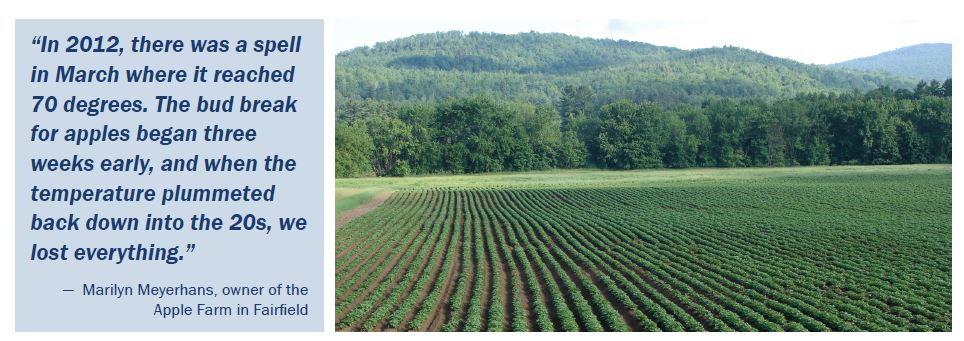Climate Change Threatens Maine’s Farms
Farming is an important part of Maine’s heritage, communities, economy, and way of life, and agriculture contributes more than $1 billion to Maine’s economy each year. But climate change is changing temperatures and bringing more extreme weather to Maine, threatening the viability of our crops and the Maine farmers who depend on them.
Climate Change Brings Warmer Temperatures, Which Can:
Harms crops
- Plants can grow faster up to a certain temperature, but growth declines with additional warming. Different crops have different ideal temperatures, so some traditional Maine crops are harmed by climate change.
- Maine’s largest crop is potatoes. They grow best in cool weather—ideally, 60-64°F, which is the current average temperature in Presque Isle during the growing season. Projected warming from climate change may reduce potato yields by 25-35 percent (1).
- Weeds may grow faster in warmer weather, outgrowing and stunting crops (2).
Increase pests
- Warmer temperatures bring new pests that damage crops. For example, the blueberry gall midge, which has been a problem in southern areas in New Jersey, is now appearing in southern Maine and damaging crop yields.
- Higher temperatures can increase damage from insects already in Maine, like the Colorado potato beetle. The beetle currently reproduces once during our growing season, but with warmer temperatures and a longer season, it could complete multiple generations each summer, damaging more crops.

Reduce fruit production
- Untimely warm spells between November and April can force fruit trees and other perennial crops to bud early,before the last spring freeze date. This puts those crops at risk from spring frosts. In November 2016, Maine apple trees blossomed too early in much of Maine, contributing to a smaller harvest.
Stress livestock
- Hot weather and humidity can stress livestock, undermining their health.
- Higher temperatures and humidity levels can affect livestock productivity, too. For example, dairy cows will produce less milk and fewer calves.

Climate Change Brings More Extreme Weather
More intense, sporadic rainfall
- Scientists say climate change will bring Maine more intense rains, which run off with less moisture absorbed into the soil. This can lead to more droughts, since rains aren’t replenishing as much soil moisture. In the summer of 2016 and 2017 Maine experienced drought conditions, despite higher than average rainfall.
- During the growing season, intense rains was out newly planted fields, damage growing crops, bring more soil erosion and nutrient run-off, and leave soil less fertile by washing away nutrients.
Longer, warmer, drier growing seasons
- Longer summers and intense heat waves cause soil and plants to lose moisture faster, requiring crops to bewatered more often and threatening crops that aren’t irrigated.

1 L. Jacobson, George & Fernandez, Ivan & Andrew Mayewski, Paul & V. Schmitt, Catherine. (2009). Maine’s climate future: an initial assessment.
2 Peters, K., Breitsameter, L. & Gerowitt, B. Agronomy for Sustainable Development (2014) 34: 707. Accessed at https://link.springer.com/article/10.1007%2Fs13593-014-0245-2
Banner photo: Blueberries in Searsport by Rebecca Tripp









